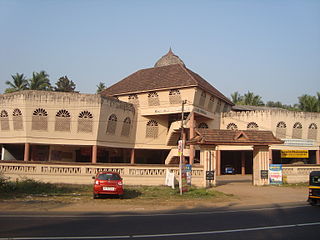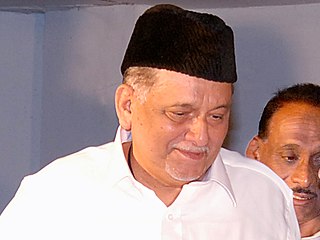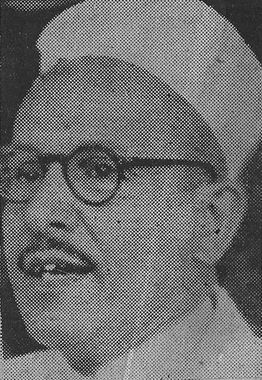Related Research Articles

Mappila Muslim, in general, is a member of the Muslim community of same name found predominantly in Kerala and Lakshadweep Islands, in southern India. Muslims of Kerala make up 26.56% of the population of the state (2011), and as a religious group they are the second largest group after Hindus (54.73%). Mappilas share the common language of Malayalam with the other religious communities of Kerala.

Cheriyan Kandi Muhammad Koya was an Indian politician who served as the 8th Chief Minister of Kerala from October to December 1979. He is more often noted for being the Minister of Education of Kerala from 1967 to 1973 and again from 1977 to 1979. After his Chief Ministership, Koya went on to become the 2nd Deputy Chief Minister of Kerala from 1981 until his death in 1983. He is the first Indian Union Muslim League member to lead a state in independent India.
The term Kerala was first epigraphically recorded as Cheras (Keralaputra) in a 3rd-century BCE rock inscription by the Mauryan emperor Ashoka of Magadha. It was mentioned as one of four independent kingdoms in southern India during Ashoka's time, the others being the Cholas, Pandyas and Satyaputras. The Cheras transformed Kerala into an international trade centre by establishing trade relations across the Arabian Sea with all major Mediterranean and Red Sea ports as well those of Eastern Africa and the Far East. The dominion of Cheras was located in one of the key routes of the ancient Indian Ocean trade. The early Cheras collapsed after repeated attacks from the neighboring Cholas and Rashtrakutas.
Mappila songs are a folklore Muslim song genre rendered to lyrics, within a melodic framework (Ishal), in Arabi Malayalam by the Mappilas of the Malabar region in Kerala, India. Mappila songs have a distinct cultural identity, while at the same time remain closely linked to the cultural practices of Kerala.

Moyinkutty Vaidyar (1852–1892), often referred to as Mahakavi, is historically considered one of the most renowned poets of the Mappila pattu genre of Malayalam language.

Mohammedali Shihab Thangal, known with the honorific prefix Sayed, was an Indian community leader, Islamic scholar and politician from Kerala. He is sometimes regarded as "the most important Mappila leader" of modern Kerala.

Islam arrived in Kerala, the Malayalam-speaking region in the south-western tip of India, through Middle Eastern merchants. The Indian coast has an ancient relation with West Asia and the Middle East, even during the pre-Islamic period.

Chandrika is an Indian daily newspaper in Malayalam language published from Kozhikode, Kerala. The newspaper currently serves as the mouthpiece of Indian Union Muslim League party in Kerala.

Arabi Malayalam is the traditional Dravidian language of the Mappila Muslim community. It is spoken by several thousand people, predominantly in the Malabar Coast of Kerala state, southern India. The form can be classified as a regional dialect in northern Kerala, or as a class or occupational dialect of the Mappila community. It can also be called a vernacular in general, or as a provincial patois, with the latter label being increasingly applicable in Colonial times. All the forms of the Malayalam language, including Mappila, are mutually intelligible.
The thangals are a social group among the Muslims of Kerala, south India. The thangals are often regarded as roughly equivalent to the more general Sayyids or Sharifs, or the descendants of the Islamic prophet Muhammad, of the wider Islamic culture. Most members of the community practices endogamy and rarely marry outside from their community.

Religion in Kerala is diverse. According to 2011 census of India figures, 54.73% of Kerala's population are Hindus, 26.56% are Muslims, 18.38% are Christians, and the remaining 0.33% follow other religions or have no religion. As of 2020, Hindus, Muslims, Christians and others account for 41.5%, 43.9%, 13.9% and 0.7% of the total child births in the state, respectively.

K. M. Seethi Sahib (1899—1961), born K. M. Seethi, was an Indian politician and community leader from Kerala. He served as the Speaker of Kerala Assembly during 1960-61.
The Samastha Kerala Jem-iyyathul Ulama, 1926, was the principal Sunni-Shafi'i scholarly body in northern Kerala. Most of the ordinary Sunnis of Kerala, adhering to Shafi'i Law, largely followed the Ulama. A forty-member 'mushawara' was the high command body of the Sunni council. The council administered thousands of Shafi'ite mosques, madrasas and Arabic Colleges.

Abdurrahiman Bafaqi Thangal (1905—1973), honorific Sayyid, title Ba Faqih, was an Indian community leader and politician from Kerala. Until his death in the early 1970s, Bafaqi Thangal remained the most prominent Muslim political leader in Kerala. He is generally credited with transforming the perception of Indian Union Muslim League inside Kerala.

Kerala Nadvathul Mujahideen (KNM) is an Islamic organization in the state of Kerala founded in 1950. The organization is part of the Islamic reformist Mujahid Movement and follows the principles of Salafism. The Kerala Nadvathul Mujahideen was formed as a result of renaissance activities among Keralite Muslims led by scholars and clerics such as Sheikh Hamadani Thangal, K.M. Moulavi and Vakkom Moulavi and E. Moidu Moulavi and Ummer Moulavi. Kerala Nadvathul Mujahideen is considered as the successor of Kerala Muslim Aikya Sangam, the first Muslim organization in the state of Kerala, founded in 1924. The Mujahid movement laid the foundations of Islamic renaissance in Kerala by campaigning against corrupted practices of the Sufi orders, superstitions, false beliefs, polytheism etc, and called for the revival of true Islamic practices to the Muslim community in Kerala which had until then been severely lacking in crucial aspects of religious and socio-civic knowledge. The Mujahids consider themselves as proponents of authentic Islamic reform, pursuing a purified concept of Tawhid.

B. Pocker, Badekkandy, also spelled Poker, title Sahib Bahadur, as an Indian politician and lawyer from Tellicherry, north Kerala, Madras Presidency. He served as a member of the Constituent Assembly of India and as the Member of Parliament from Manjeri Parliamentary Constituency between 1952 and 1962.
Madayi Mosque is mosque at Pazhayangadi in Kannur district, northern Kerala. It is one of the oldest mosques in Kerala, with local legends dating back to the 7th century AD. It is believed to have been established by Malik ibn Dinar and contains a block of white marble said to have been brought from Mecca by ibn Dinar. It is one of the several mosques around Pazhayangadi/Payangadi. It is situated on the banks of Kuppam River, which joins Valapattanam River at its estuary.

C. N. Ahmad Moulavi was an Indian writer of Malayalam literature, best known as the translator of the first complete publication of Quran in Malayalam. He was the author of a number of books on Islam and was reported to have contributed to the propagation of education among the Muslims of Malabar region. A member of the Kerala Sahitya Akademi during the period 1959–64, Moulavi was honoured by the academy with the distinguished fellowship in 1989.
Stephen Frederic Dale, also known as Stephen F. Dale, is a historian and academic, Emeritus Professor at the Ohio State University, known for his studies on eastern Islamic world.

Pukkoya family of Panakkad is a Yemeni-origin sayyid (thangal) family based in present-day northern Kerala. The family, claiming descent from the family of Prophet Muhammad, is generally revered by the Sunni Shāfiʿī Kerala Muslims. The thangals remain highly respected as religious and political leaders amongst the Muslims of Kerala.
References
- 1 2 Jeffrey, Robin. "Politics, Women and Well-Being: How Kerala became a Model" Palgrave McMillan (1992); 112 and 114.
- ↑ Mappila Muslim Culture.
- 1 2 Dale, Stephen F. (1979). "Mappila Muslims of Kerala (review)" . The Journal of Asian Studies. 39 (1): 196–198. doi:10.2307/2053549. ISSN 1752-0401. JSTOR 2053549. S2CID 153619298.